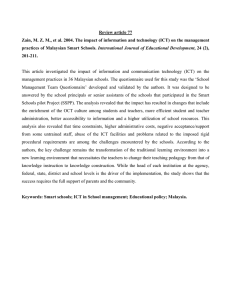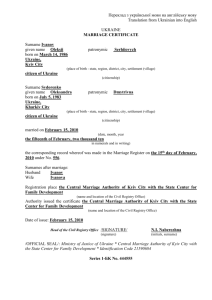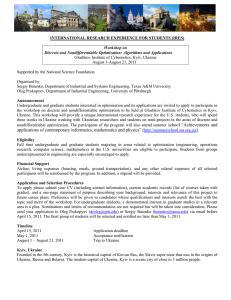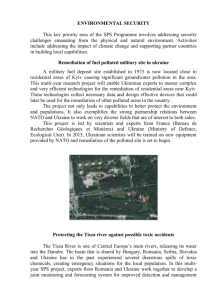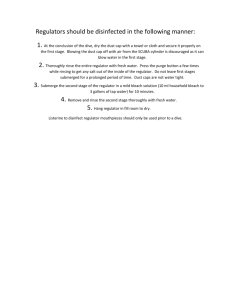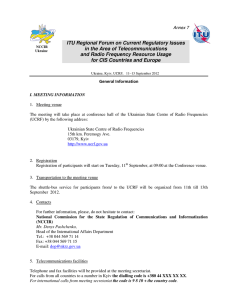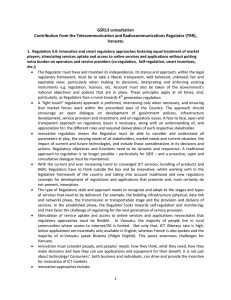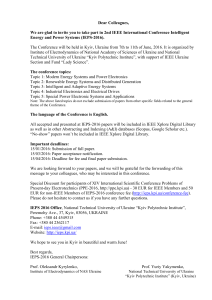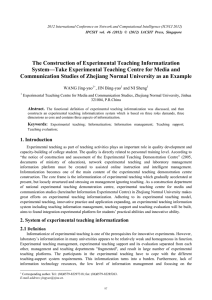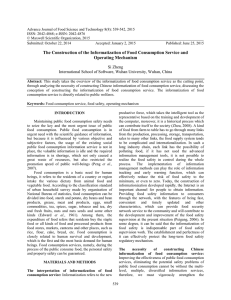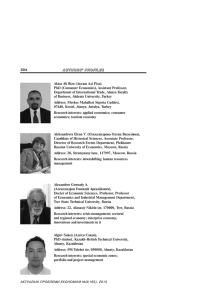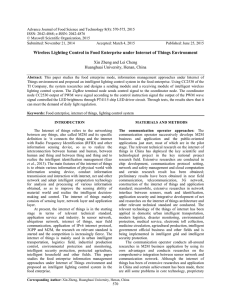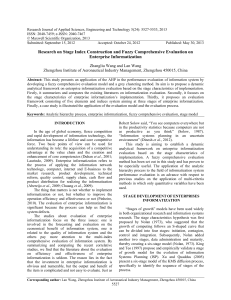GSR13 Consultation Contribution from the National Commission for the State
advertisement
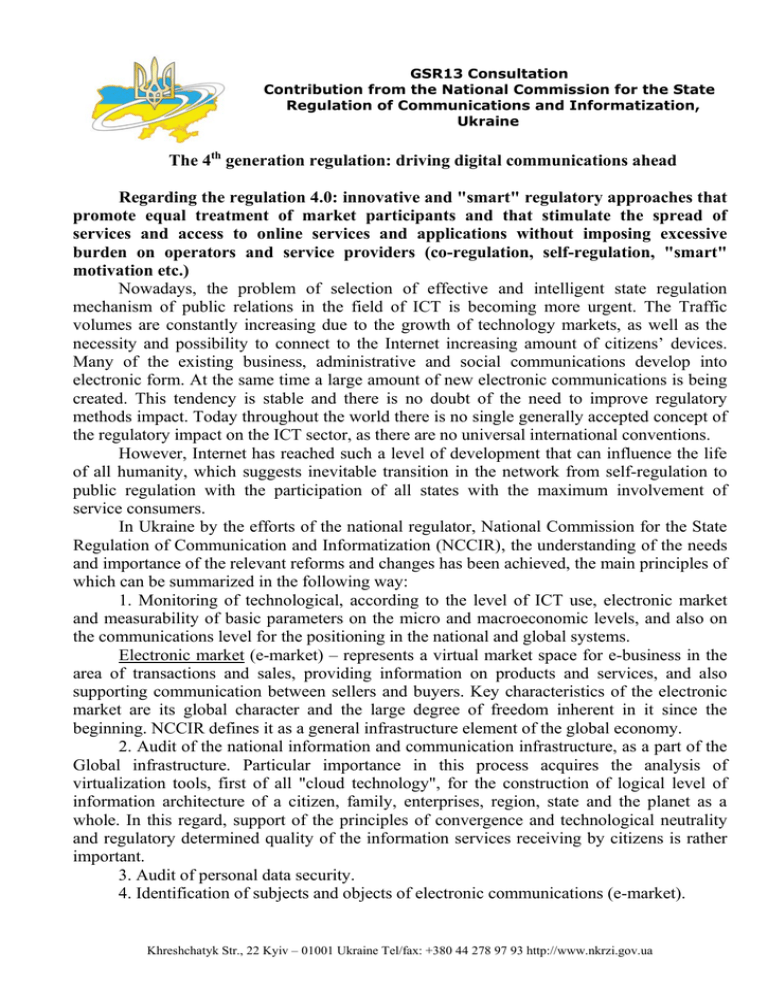
GSR13 Consultation Contribution from the National Commission for the State Regulation of Communications and Informatization, Ukraine The 4th generation regulation: driving digital communications ahead Regarding the regulation 4.0: innovative and "smart" regulatory approaches that promote equal treatment of market participants and that stimulate the spread of services and access to online services and applications without imposing excessive burden on operators and service providers (co-regulation, self-regulation, "smart" motivation etc.) Nowadays, the problem of selection of effective and intelligent state regulation mechanism of public relations in the field of ICT is becoming more urgent. The Traffic volumes are constantly increasing due to the growth of technology markets, as well as the necessity and possibility to connect to the Internet increasing amount of citizens’ devices. Many of the existing business, administrative and social communications develop into electronic form. At the same time a large amount of new electronic communications is being created. This tendency is stable and there is no doubt of the need to improve regulatory methods impact. Today throughout the world there is no single generally accepted concept of the regulatory impact on the ICT sector, as there are no universal international conventions. However, Internet has reached such a level of development that can influence the life of all humanity, which suggests inevitable transition in the network from self-regulation to public regulation with the participation of all states with the maximum involvement of service consumers. In Ukraine by the efforts of the national regulator, National Commission for the State Regulation of Communication and Informatization (NCCIR), the understanding of the needs and importance of the relevant reforms and changes has been achieved, the main principles of which can be summarized in the following way: 1. Monitoring of technological, according to the level of ICT use, electronic market and measurability of basic parameters on the micro and macroeconomic levels, and also on the communications level for the positioning in the national and global systems. Electronic market (e-market) – represents a virtual market space for e-business in the area of transactions and sales, providing information on products and services, and also supporting communication between sellers and buyers. Key characteristics of the electronic market are its global character and the large degree of freedom inherent in it since the beginning. NCCIR defines it as a general infrastructure element of the global economy. 2. Audit of the national information and communication infrastructure, as a part of the Global infrastructure. Particular importance in this process acquires the analysis of virtualization tools, first of all "cloud technology", for the construction of logical level of information architecture of a citizen, family, enterprises, region, state and the planet as a whole. In this regard, support of the principles of convergence and technological neutrality and regulatory determined quality of the information services receiving by citizens is rather important. 3. Audit of personal data security. 4. Identification of subjects and objects of electronic communications (e-market). Khreshchatyk Str., 22 Kyiv – 01001 Ukraine Tel/fax: +380 44 278 97 93 http://www.nkrzi.gov.ua The results of the work done by the national regulator on auditing and monitoring definitely must be public, comprehensively described and widely discussed in public. Electronic market can not develop in hostile environment on the part of the state machine. Public authorities should be responsible for the establishing and functioning of commodity markets, and the regulator, in its turn, - for the infrastructural electronic market in terms of the e-economy. The regulator should focus on its assessment and condition, identify and develop measures to overcome shortcomings. Positions of the participants of the electronic market on the way to economic growth (the degree of the goals achievement) will depend on the availability of opportunities for growth in the external environment, as well as the ability of the market regulators and market participants to use these opportunities. The strategic goal of regulation of the electronic market is the ability to guarantee social, spiritual and material needs of people. The goal criterion is steady economic growth of the state, accompanied by a qualitative improvement of living standards of the population (to get a wide range of high quality electronic services). Regarding the changing role of the regulatory body. Regulatory body as a partner in development and social integration. The need of the structure adaptation and the institutional model of the regulatory body for the regulation development in the future. World development of electronic markets is becoming less predictable and foreseeable and very dynamic in its development. Hence, the obvious urgency of elaboration of the predictive theoretical models of their development is obvious. The regulatory system in these conditions is becoming the maximum open, agile, flexible, such criterion as the ability to quickly adapt to the emerging changes and effectively and timely respond to them becomes more important. The main objective of the regulatory body is seen in coordination of arising contradictions between the interests of different groups of participants and clear understanding of the development trends of the electronic market in the short- and midterm perspective. In turn, effectiveness indicators of electronic market management are becoming systematically oriented and multi-dimensional. Evidently, none of the levels of governmental regulation (legal, regulatory, organizational, taxing, monopoly etc.) will lose their value, but in the new conditions of global development it is difficult not to notice the impact of technical and information regulation importance which is increasing. In its turn, state regulation of the electronic market should be aimed at stimulating innovation processes which create new resources for sustainable economic growth. Therefore, any regulatory impact on the deviation from the established market norms requires deep analysis of the situation to be carried out but not in a formal way. The structure and the institutional model of the regulatory body should be open, adaptive, with well-established dynamics. Today it is also clear that the world is not homogeneous and is not identical to its readiness to regulate the electronic market at the 4th generation level, however, the goals and priorities in many countries are similar. So we should move to the smart global management of the electronic market in real time with the participation of an increasing number of countries. Khreshchatyk Str., 22 Kyiv – 01001 Ukraine Tel/fax: +380 44 278 97 93 http://www.nkrzi.gov.ua


